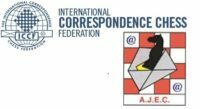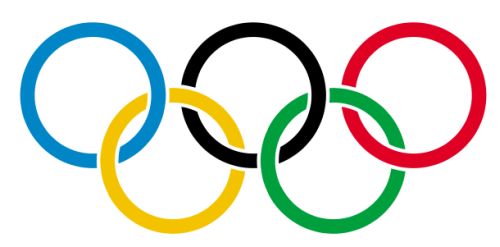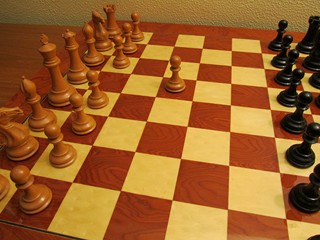Tournois joués sur le serveur de l’ICCF
1) Play and Control
a. Games shall be played in accordance with the FIDE Laws of Chess, except as otherwise defined in these rules or other ICCF rules.
b. A Tournament Director shall be appointed who shall be responsible for the conduct of the tournament and progress of the games.
c. TEAM: Each team has a Team Captain who shall maintain contact on behalf of the Players with the Tournament Director.
d. TEAM: In cases of misunderstanding between players the Team Captains should try to solve the problem before it is sent to the Tournament Director.
e. Games shall be played by using the ICCF Webserver. If a player should lose internet access and is unable, for whatever reason, to re-establish access within 30 days, he/she will be considered to have withdrawn from the tournament. The period of 30 days is allowed once a year.
f. Results of games which progress to their normal conclusion, will be automatically recorded and the Tournament Director will be informed, through the system. In all other circumstances, players are responsible for making claims or communicating with the Tournament Director, for the resolution of problems or disputes.
g. TEAM: Results of games which progress to their normal conclusion, will be automatically recorded and the Tournament Director will be informed, through the system. In all other circumstances, Team Captains are responsible for making claims or communicating with the Tournament Director, for the resolution of problems or disputes.
h. These rules will normally apply for all tournaments (team tournaments) played using the ICCF Webserver, unless varied by tournament announcements and starting notices.
2) Transmissions
a. All moves shall be made by committing them through the ICCF Webserver.
b. The ICCF Webserver system will generate an immediate Email message informing the opponent of the move played and giving other relevant information.
c. Players are responsible for monitoring the progress and time utilisation for all of their games on the ICCF Webserver.
3) Failure to Reply
a. The ICCF Webserver system will automatically generate an Email reminder when a player has not made a move for 14 days and another, after 28 days. A final Email reminder will also be automatically generated after 35 days of silence by a player.
b. If a player gets the final reminder after 35 days, he has to report to the Tournament Director and to his opponent within 5 days that he will continue the game. If there is no such a message from the player before or during this period the game maybe scored as lost by the Tournament Director.
b. TEAM: If a player gets the final reminder after 35 days, he has to report to the Tournament Director via the Teamcaptain and to his opponent within 5 days that he will continue the game. If there is no such a message from the player before or during this period the game maybe scored as lost by the Tournament Director.
4) Conditional continuations
a. Conditional moves are not allowed in webserver games.
5) Records and Reports
a. All transmissions concerning the game and a record of the moves and dates will be kept by the ICCF Webserver system until the end of the tournament and this will be available to the Tournament Director, as required.
b. As a further safeguard, a player is required to maintain a record of the moves and playing time used by both players until the game has been completed eg a copy of latest system notification (as described in 2b), and he/she must send information to the Tournament Director, as requested.
c. If a player does not answer enquiries from the Tournament Director, that player may be deemed to have withdrawn from the tournament.
d. Changes of permanent address and Email address shall be made by the player under his personal settings maintained in the system.
d. TEAM: These addresses only shall be disclosed to the Tournament Office, Team Captain and Tournament Director.
e. The Tournament Director must be notified immediately of any disagreement between competitors about the game.
e. TEAM: Through the Team Captain the Tournament Director must be notified immediately of any disagreement
between competitors about the game.
f. The Tournament Director and opponents must be notified immediately if any substantial failure of hardware or software occurs.
g. TEAM: Through the Team Captain, the Tournament Director must be notified immediately if any substantial failure of hardware or software occurs.
6) Time Allowed and Penalties
a. Each competitor is allowed 50 days for every 10 moves, unless the tournament announcement explicitly specifies otherwise.
b. Time saved shall be carried forward.
c. Playing time will normally be counted in days (ie 24 hour periods). A player will have 24 hours to respond to a move, before one day of playing time is recorded by the ICCF Webserver system. Partial days (ie periods of less than 24 hours) will be disregarded, in calculating a player’s aggregated playing time.
d. If a player uses more than 20 days of reflection for one move, the count of reflection days after 20 reflection days will be doubled. This means that a player who used 23 calender days will be counted as having used 26 reflection days. This will not affect the basis for reminders or other rules like 3b, which handles calender days (leaves not included). Of course, it will affect exceeding the time limit.
e. The basis for ICCF Webserver date/time will be Greenwich Mean Time (GMT), or other central time defined by the location of the server.
f. A competitor who has exceeded the time allowed shall forfeit the game.
7) Leave
a. Each competitor may claim up to a total of 30 days leave during each calendar year.
b. Players intending to take such leave must send the information in advance to the ICCF Webserver system, using the facilities provided. It is not possible for players to make moves via the webserver system, during their notified periods of leave.
c. In addition, the Tournament Director may grant up to 30 days’ additional leave per annum which in exceptional circumstances may be back-dated and/or extended. Applications for such leave must be sent to the Tournament Director.
8) Withdrawal, death [and Substitution]
a. In the event of death all remaining games of the deceased player will be adjudicated. If he hasn’t finished a single game, his games will be cancelled.
b. In the event of withdrawal the TD shall decide according to what is prescribed in the Tournament Rules 6.3.
a. TEAM: In the event of withdrawal or death, the Tournament Director shall call upon the Team Captain to replace this player within two months.
b. TEAM: The substitute player may be required to start with a time penalty. The new player starts on a date set by the Tournament Director.
c. TEAM: If no substitute player is available, the Tournament Director shall decide according to what is prescribed in the Tournament Rules 6.3.
d. TEAM: A team may substitute at most 50% of its players in case of withdrawal, and only make one substitution per board, but there is no limit for cases of death.
9) Adjudication
If no result has been agreed by the date set for close of play, or in the event of accepted withdrawal the TD will start the adjudication procedure.
10) Decisions and Appeals
a. The Tournament Director may penalise or disqualify players who break these rules.
b. Any matter not covered in these rules shall be decided by the Tournament Director according to principles stated in ICCF Statutes and Rules, Code of Conduct Guidelines or the FIDE Laws of Chess, as applicable. In cases of the system outage, the Tournament Director will decide if the players’ clocks will be adjusted accordingly.
c. A player may appeal within 14 days of receiving a decision from the Tournament Director to the Chairman of the respective ICCF Appeals Commission (using the ICCF Webserver facilities provided), whose ruling shall be final.
c. TEAM: A player may appeal within 14 days of receiving a decision of the Tournament Director, through the Team Captain, to the Chairman of the respective ICCF Appeals Commission (using the ICCF Webserver facilities provided), whose ruling shall be final.
[These playing rules were adopted by the ICCF Congress, Pleven 2008 and take effect from 1.1.2009]
a. Games shall be played in accordance with the FIDE Laws of Chess, except as otherwise defined in these rules or other ICCF rules.
b. A Tournament Director shall be appointed who shall be responsible for the conduct of the tournament and progress of the games.
c. TEAM: Each team has a Team Captain who shall maintain contact on behalf of the Players with the Tournament Director.
d. TEAM: In cases of misunderstanding between players the Team Captains should try to solve the problem before it is sent to the Tournament Director.
e. Games shall be played by using the ICCF Webserver. If a player should lose internet access and is unable, for whatever reason, to re-establish access within 30 days, he/she will be considered to have withdrawn from the tournament. The period of 30 days is allowed once a year.
f. Results of games which progress to their normal conclusion, will be automatically recorded and the Tournament Director will be informed, through the system. In all other circumstances, players are responsible for making claims or communicating with the Tournament Director, for the resolution of problems or disputes.
g. TEAM: Results of games which progress to their normal conclusion, will be automatically recorded and the Tournament Director will be informed, through the system. In all other circumstances, Team Captains are responsible for making claims or communicating with the Tournament Director, for the resolution of problems or disputes.
h. These rules will normally apply for all tournaments (team tournaments) played using the ICCF Webserver, unless varied by tournament announcements and starting notices.
2) Transmissions
a. All moves shall be made by committing them through the ICCF Webserver.
b. The ICCF Webserver system will generate an immediate Email message informing the opponent of the move played and giving other relevant information.
c. Players are responsible for monitoring the progress and time utilisation for all of their games on the ICCF Webserver.
3) Failure to Reply
a. The ICCF Webserver system will automatically generate an Email reminder when a player has not made a move for 14 days and another, after 28 days. A final Email reminder will also be automatically generated after 35 days of silence by a player.
b. If a player gets the final reminder after 35 days, he has to report to the Tournament Director and to his opponent within 5 days that he will continue the game. If there is no such a message from the player before or during this period the game maybe scored as lost by the Tournament Director.
b. TEAM: If a player gets the final reminder after 35 days, he has to report to the Tournament Director via the Teamcaptain and to his opponent within 5 days that he will continue the game. If there is no such a message from the player before or during this period the game maybe scored as lost by the Tournament Director.
4) Conditional continuations
a. Conditional moves are not allowed in webserver games.
5) Records and Reports
a. All transmissions concerning the game and a record of the moves and dates will be kept by the ICCF Webserver system until the end of the tournament and this will be available to the Tournament Director, as required.
b. As a further safeguard, a player is required to maintain a record of the moves and playing time used by both players until the game has been completed eg a copy of latest system notification (as described in 2b), and he/she must send information to the Tournament Director, as requested.
c. If a player does not answer enquiries from the Tournament Director, that player may be deemed to have withdrawn from the tournament.
d. Changes of permanent address and Email address shall be made by the player under his personal settings maintained in the system.
d. TEAM: These addresses only shall be disclosed to the Tournament Office, Team Captain and Tournament Director.
e. The Tournament Director must be notified immediately of any disagreement between competitors about the game.
e. TEAM: Through the Team Captain the Tournament Director must be notified immediately of any disagreement
between competitors about the game.
f. The Tournament Director and opponents must be notified immediately if any substantial failure of hardware or software occurs.
g. TEAM: Through the Team Captain, the Tournament Director must be notified immediately if any substantial failure of hardware or software occurs.
6) Time Allowed and Penalties
a. Each competitor is allowed 50 days for every 10 moves, unless the tournament announcement explicitly specifies otherwise.
b. Time saved shall be carried forward.
c. Playing time will normally be counted in days (ie 24 hour periods). A player will have 24 hours to respond to a move, before one day of playing time is recorded by the ICCF Webserver system. Partial days (ie periods of less than 24 hours) will be disregarded, in calculating a player’s aggregated playing time.
d. If a player uses more than 20 days of reflection for one move, the count of reflection days after 20 reflection days will be doubled. This means that a player who used 23 calender days will be counted as having used 26 reflection days. This will not affect the basis for reminders or other rules like 3b, which handles calender days (leaves not included). Of course, it will affect exceeding the time limit.
e. The basis for ICCF Webserver date/time will be Greenwich Mean Time (GMT), or other central time defined by the location of the server.
f. A competitor who has exceeded the time allowed shall forfeit the game.
7) Leave
a. Each competitor may claim up to a total of 30 days leave during each calendar year.
b. Players intending to take such leave must send the information in advance to the ICCF Webserver system, using the facilities provided. It is not possible for players to make moves via the webserver system, during their notified periods of leave.
c. In addition, the Tournament Director may grant up to 30 days’ additional leave per annum which in exceptional circumstances may be back-dated and/or extended. Applications for such leave must be sent to the Tournament Director.
8) Withdrawal, death [and Substitution]
a. In the event of death all remaining games of the deceased player will be adjudicated. If he hasn’t finished a single game, his games will be cancelled.
b. In the event of withdrawal the TD shall decide according to what is prescribed in the Tournament Rules 6.3.
a. TEAM: In the event of withdrawal or death, the Tournament Director shall call upon the Team Captain to replace this player within two months.
b. TEAM: The substitute player may be required to start with a time penalty. The new player starts on a date set by the Tournament Director.
c. TEAM: If no substitute player is available, the Tournament Director shall decide according to what is prescribed in the Tournament Rules 6.3.
d. TEAM: A team may substitute at most 50% of its players in case of withdrawal, and only make one substitution per board, but there is no limit for cases of death.
9) Adjudication
If no result has been agreed by the date set for close of play, or in the event of accepted withdrawal the TD will start the adjudication procedure.
10) Decisions and Appeals
a. The Tournament Director may penalise or disqualify players who break these rules.
b. Any matter not covered in these rules shall be decided by the Tournament Director according to principles stated in ICCF Statutes and Rules, Code of Conduct Guidelines or the FIDE Laws of Chess, as applicable. In cases of the system outage, the Tournament Director will decide if the players’ clocks will be adjusted accordingly.
c. A player may appeal within 14 days of receiving a decision from the Tournament Director to the Chairman of the respective ICCF Appeals Commission (using the ICCF Webserver facilities provided), whose ruling shall be final.
c. TEAM: A player may appeal within 14 days of receiving a decision of the Tournament Director, through the Team Captain, to the Chairman of the respective ICCF Appeals Commission (using the ICCF Webserver facilities provided), whose ruling shall be final.
[These playing rules were adopted by the ICCF Congress, Pleven 2008 and take effect from 1.1.2009]





